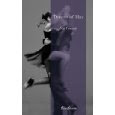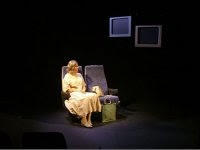While I was on the other side of the pond, The Guardian ran a story on its website here entitled “Are Theatre and Poetry Really So Different?” Ah, a topic close to my heart. This piece begins what could be a rather complicated, though inevitably fascinating discussion about the use of language and the meaning of poetry. The author, Natasha Tripney, discusses how poets often write for the stage and wonders aloud about whether there really is a difference between the two at all. To me, I actually believe all good writing, regardless of genre, aims to be poetry, ie language that attends not only to meaning, but also to sound, rhythm, nuance, the juxtoposition of seemingly disparate ideas in order to create new meanings. She quotes some so-called “performance poets,” which is a start, but she seems to infer that these poets are the predominant poetic play-makers. Their poems are written not to be read silently alone, but to hear performed by the poet in communal spaces.
This is a discussion I’d like to continue, if anyone is interested. And I’ll start the continuation (?) by saying that there is also a difference between performance poetry and a poetic play. Performance poetry is indeed meant to be spoken to an audience, but generally it is spoken by the writer herself. But I believe that for a play to go “beyond” poetry, it needs to have both action and character. A character must be created whom the audience watches change through experience and time. Poetry, therefore, only really becomes a work of theatre when the actor does not need to be the poet — perhaps I’ll go so far as to say that the magic really happens when an actor definitely is NOT the writer. Then a new character has been created, and it stands alone away from the writer and open to the interpretation of others, such as a director or an actor. Having written both poetry and plays, not to mention pieces that combine the two, I have found that the theatre is the place where the writer can disappear the most, indeed must disappear. Play writing is the most collaborative of art forms. When an actor speaks words that a poet has written and uses those words to create a new character, that’s when a poem moves from a spoken or theatrical event to a “play.” If you read Dreams of May, you might get a better idea of what I mean (of course I have to plug my own stuff, right?). The title page of the published text calls it “A Play with Poetry”. There is a distinction to be made.
Any thoughts?


I’ve never written for the stage but I have written for TV and there you definitely disappear- way too many cooks in that kitchen!
I agree too that your poetry play is very different from a performance poem. Your play straddles the divide of a written poem and play, in many ways quite far away from a poem for performance by the writer herself.
I won’t pretend to be up on this. But I absolutely love Becket and Pinter. For me Waiting for Godot and The Caretaker don’t need to be understood. The words and the performance are all that you need.
Just as Bob Dylan (oh no not again you say) with his song Brownsville Girl is a film and of course it was co-written with the playwright Sam Shepherd.
Thanks for this considered and thought-provoking response to my Guardian blog.
Though the edited verison of the piece actually came across as a little more oppositional than I would have liked, this is exactly the sort of discussion I was hoping to start as I’m really interested in how poets and performers feel about their work in this regard; the space between play and poem is a fascinating one.
Lauri: Yep, you’ve got it! Thanks so much for taking the time to read it and think about it!
Glyn: Oh, dear repository of Dylan knowledge –I didn’t know Brownsville Girl was co-written with Sam Shepherd. And I love Shepherd, too!
Interval: How nice to see you here. Thanks for taking the timer to respond. I’d love to send you a copy of Dreams of May, if you’d like to take a look. I’ll hop over to your blog and ask you there, too.